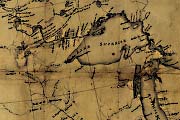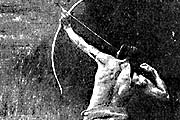| Jefferson's Instructions
While Lewis completed his Philadelphia "schooling," Jefferson finalized the formal instructions for the expedition. With the help of close advisers such as Albert Gallatin, his secretary of treasury, and Levi Lincoln, his attorney general, Jefferson whittled down his long wish list to the essentials the journey would address.
 |
| This map of the Northwest was put together by cartographer Nicholas King at Albert Gallatin's direction in 1803. It combined elements from maps drawn by Aaron Arrowsmith, Andrew Ellicott, James Cook, George Vancouver, and others. Image courtesy of the Library of Congress, Geography and Map Division. |
"The object of your mission is to explore the Missouri river, & such principal streams of it, as, by it's course & communication with the waters of the Pacific Ocean, may offer the most direct & practicable water communication across this continent, for the purposes of commerce.
"Beginning at the mouth of the Missouri, you will take observations of latitude & longitude, at all remarkable points on the river, & especially at the mouths of rivers, at rapids, at islands & other place & objects distinguished by such natural marks & characters of a durable kind, as that they may with certainty by recognized hereafter...Your observations are to be taken with great pains & accuracy, to be entered distinctly, & intelligibly for others as well as yourself, to comprehend all the elements necessary, with the aid of the usual tables, to fix the latitude and longitude of the place at which they were taken, & are to be rendered to the war office, for the purpose of having the calculations made concurrently by proper persons with the U.S..."
|
Just as important as learning exactly where the land stretched was knowing the natives who inhabited it.
 |
| President Jefferson's instructions for the expedition made a point of learning what the explorers could about Native American culture and life. Image © 2002 www.clipart.com. |
"...you will therefore endeavor to make yourself acquainted, as far as a diligent pursuit of your journey shall admit, with the names of the nations & their numbers; the extent of their possessions; their relations with other tribes or nations; their language, traditions, monuments; their ordinary occupations in agriculture, fishing, hunting, war, arts, & the implements for these; their food, clothing, & domestic accommodations..."
|
Jefferson and Lewis knew this was a commerce trip. They hoped to find a Northwest Passage that would open up trade to the Far East and provide an outlet for the furs and other products of the United States. However, what if no Northwest Passage was found. Gallatin suggested that the instructions emphasize the agricultural, geological, and scientific possibilities. That way, the trip could be considered a success regardless of what happened with discovering a trade route. As a result, Jefferson's instructions directed Lewis to note these discoveries:
|
"the soil & face of the country, it's growth & vegetable productions; especially those not of the U.S. the animals of the country generally, & especially those not known in the U.S. the remains and accounts of any which may be deemed rare or extinct the mineral productions of every kind; but more particularly metals, limestone, pit coal & salpetre; salines & mineral waters, noting the temperature of the last, & such circumstances as may indicate their character."
|
Lincoln added a change to appeal to the Federalists and New England clergy, who would balk at the cost of the expedition:
|
"it will be useful to acquire what knolege you can of the state of morality, religion & information among them, as it may better enable those who endeavor to civilize & instruct them ..."
|
A chance to convert the heathens!
The rest of the document guided Lewis to be friendly to the Indian nations he'd encounter and work to bring them and their trade under the flag of the United States. Finally, Jefferson emphasized that Lewis be prudent in the face of hostility. It would be more important to return alive with what he had learned than to be killed and risk losing all the information he had gathered.
< previous | next > |